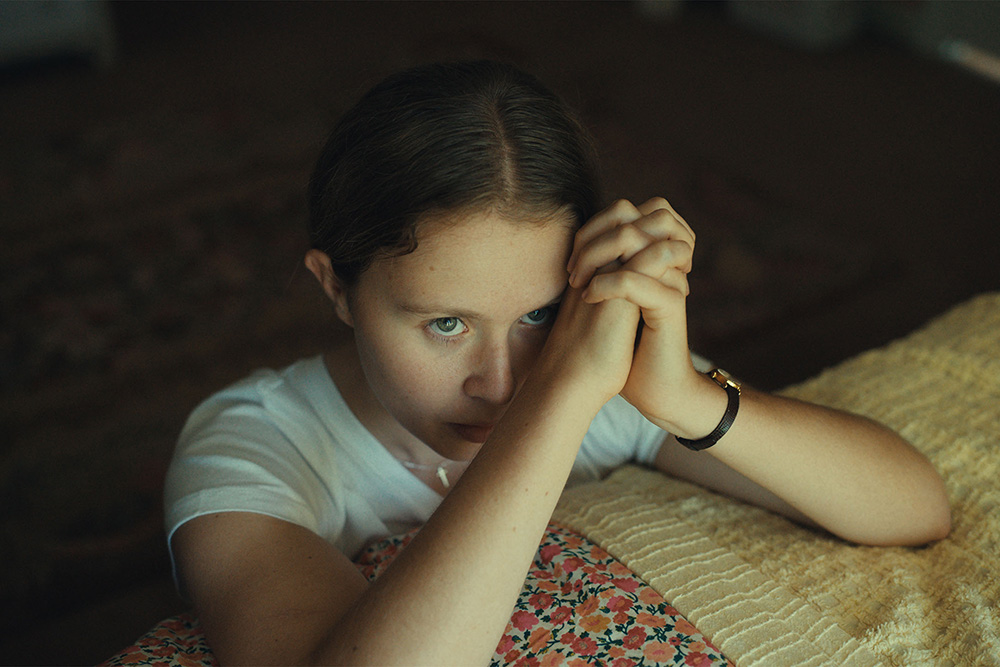
Eliza Scanlen in "The Starling Girl" (Courtesy of Sundance Institute)
Scripture is rarely used as a means of seduction, and yet the effect 1 Corinthians 13 has on the young Jem Starling (Eliza Scanlen) completely sweeps her off her feet.
"If I speak in the tongues of men and of angels, but have not love, I am only a resounding gong or a clanging cymbal," she reads and sighs, as her imagination most likely runs wild creating romantic scenarios for her and Owen Taylor (Lewis Pullman). With his James Dean swagger and cigarette-smoking, the youth pastor, recently returned from ministry abroad, ignites a fire in Jem that not even prayer seems to calm.
Owen cites 1 Corinthians 13 and his love for Mexican food in a profile that Jem sees as an entry point into his heart. The problem is he's not only much older than her, but also happens to be married. The teenage girl's desire for both holiness and earthly pleasures is at the center of Laurel Parmet's insightful drama "The Starling Girl," which also asks: Is there truly one way to praise that's better than others?
Jem is part of a Christian fundamentalist community where Scripture is memorized and repeated, rather than experienced, leading to confusion among the younger church members who choose to live in ignorance, rather than investigate and broaden their horizons. But Parmet is too sensitive a filmmaker to turn this into yet another criticism of faith and religion. We know very well that religion unchallenged and misunderstood becomes dogma, a spiritual dictatorship, so what Parmet's film does so well is suggest God also lives in Jem's desire.
Before Owen's reappearance, all Jem wants is to dance for Jesus; she's part of her church's worship dance group where the girls are often urged to differentiate between ego and praise, "too much leg," and embellished hand gestures are chided and corrected with simpler, more mechanical moves — a reminder that congregants should think of God and not the dancers during the performance.
But Jem can't make sense of how a God that wants her constant praise would also deny her the pleasures of knowing herself, or why he's made her father, Paul (a moving Jimmi Simpson), so sad and distant recently. In her household, Jem becomes an extension of her mother, Heidi (Wrenn Schmidt), and helps take care of her younger siblings. She's being trained to become a wife and mother, and when Pastor Taylor (a chilling Kyle Secor) arrives with his youngest son, Ben (Austin Abrams), to begin a formal courtship, Jem must sit quietly and nod her head, instead of yelling that it's Ben's older brother she truly wants.
Believing herself to be much more mature and wiser than her age, Jem uses her skills to constantly flirt with Owen, until one day, he responds in kind. In yet another marvelous twist, Parmet doesn't turn the film into facile commentary on irresponsible and inappropriate sexual power dynamics. We know Owen is doing wrong, and the director (who also wrote the screenplay) frames his eventual feelings of guilt as an example of both religious hypocrisy and the impossibility of meeting standards that make no sense.
Advertisement
With each new development, "The Starling Girl" effortlessly escapes the boundaries of genre and viewer expectations, seamlessly going from a coming-of-age tale to a psychological thriller.
What grounds the experience is Scanlen's committed performance. Very much like Gene Kelly in "Singin' in the Rain," her spirit has "gotta dance," and distilled in dramatic terms, the actor never loses sight of her character's objective. She shines in quieter moments with Simpson, whose character reveals new layers, leading to a gut-wrenching discovery, and it's impossible not to feel the butterflies she feels when Jem looks at Owen, although Scanlen's eyes also establish Jem knows she's playing with fire.
If "The Starling Girl" doesn't always hit all the expected marks, it has more to do with what we have learned to see in films set in Christian communities than it does with the film itself. By the end, nothing has been tied up and Jem finds herself in the depths of a hell of her own making. Experience and growing from one's mistakes, she learns, is also a kind of divine gift, the purpose of free will even.
This isn't to say the film hands out rewards or punishment. Instead, it flows with the rhythm of life's stream, where sometimes the darkness of a stagnant pond makes us forget that the sweetest water waits right around the bend.









